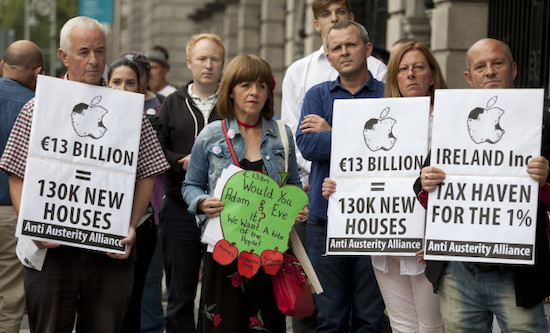
At first glance, the 26 Counties of Ireland’s economic hit from coronavirus appears to be much softer than other EU member states. While in the first half of 2020 exports fell by around 3%, they fell by around 40% in Spain and Portugal. Ireland’s real GDP contracted by 2.1% in the first quarter of 2020 and 6.1% in the second quarter, while in Italy real GDP contracted by 18% in the first half of the year. But closer analysis reveals that these figures are cushioned by high numbers of exports from multinational corporations. Although demand for Irish domestic exports fell by one fifth in the first two quarters of 2020, overall demand remained high due to the activities of foreign multinationals – in particular US pharmaceutical and business service corporations – that have set up base in Ireland. RIA AIBHILIN reports.
Having one of the lowest corporation tax rates in Europe, Ireland has attracted big-name multinationals such as Google, Apple and Allergan to open headquarters there. Over half of all employment from foreign direct investment is generated by US companies. Ireland has positioned itself as a cheap entry point for US capital into the EU, exemplified in the Apple case of 2016. When the European Commission demanded that the US technology giant Apple pay €13bn to the Irish state for years of paying as little as 0.005% in taxes the Irish government voted to reject the payment. Though the EU bloc wants to attract US capital investment it certainly does not want to give its imperialist rival a leg-up with easy access to its markets. But Ireland would not budge, needing to sell itself as a tax haven for US investment. It has no real productive base to support economic growth; 76.98% of the population are employed in services. After appealing against the decision, in 2020 the European General Court ruled against the EU and in favor of Apple and Ireland.
Over 441,000 people in Ireland are now employed directly and indirectly through foreign direct investment. The financial muscle of these corporations obscures the real impact on the country from the coronavirus pandemic. Early lockdown implementations meant the overall death rate in Ireland has been kept low in comparison to Britain, but it has also meant that domestic industries have been badly impacted. The tourist industry, which employs 12% of the population, has contracted by almost 70% – one of the worst rates in the EU. A no-deal Brexit will cause further economic distress.
Whether Britain will leave the EU with a deal or without one remains unclear. Britain’s proposed Internal Markets Bill, removing key conditions on trade customs with the North of Ireland, is in violation of international law as it breaks the previously agreed withdrawal agreement between Britain and the EU. Leaving without a deal could mean the imposition of a customs border between the 26 Counties and the Six Counties of occupied Ireland. The ruling classes of Britain and Ireland fear what a ‘hard border’ might mean in accelerating support for the movement for the reunification of Ireland, which has been gaining momentum in recent years. An added layer of pressure on the Johnson government to concede on its Internal Markets Bill is the incoming Biden administration, which has made clear that a US-Britain trade deal is dependent on ‘respect for the Good Friday Agreement and preventing the return of a hard border in Ireland.’ US imperialist interests can be better promoted by Britain to the EU if the two remain on good terms. Further, the Irish diaspora in the US is split between the Democrat and Republican vote. The diaspora carries weight in swing states such as Pennsylvania, and therefore remains a key group to appeal to electorally.
If the British government ignores the warnings from its senior partner and crashes out of Europe without a deal, Irish agricultural and food sectors will suffer enormously. Britain accounts for 38% of agriculture and food products exported from the Republic of Ireland. In the Six Counties, three quarters of agricultural products are exported to Britain and the Irish Republic. Custom border checks are expected to cause serious delays in processing, while Irish Central Bank Governor Gabriel Makhlouf warns that a no-deal Brexit could add €1.5bn of tariffs on exports to Britain. The European Central Bank published research concluding that if a deal is not reached between the EU and Britain the eurozone overall can expect to lose between 0.3% to 1.5% of GDP, but the Irish state will be hit harder with losses of 2% of GDP.
With Ireland’s economic future uncertain, one thing we can be sure of is that it will be the Irish working class who pay the price for the impacts from coronavirus and Brexit. We have already seen the erosion of the Pandemic Unemployment Payments (PUP). All those forced out of work because of the pandemic were from March to June given €350 a week; from June new rates were introduced which saw tens of thousands having their PUP cut to €300 a week, with 60,000 more receiving just €203. Payments will stop in April, but there is no guarantee that the hundreds of thousands of people pushed out of their jobs will be able to start work again then. The imperialist occupation in the North of Ireland continues to undermine curbs on the spread of the virus as differences in data protection laws makes it difficult to track and trace those who are travelling across the border after testing positive for the virus.




